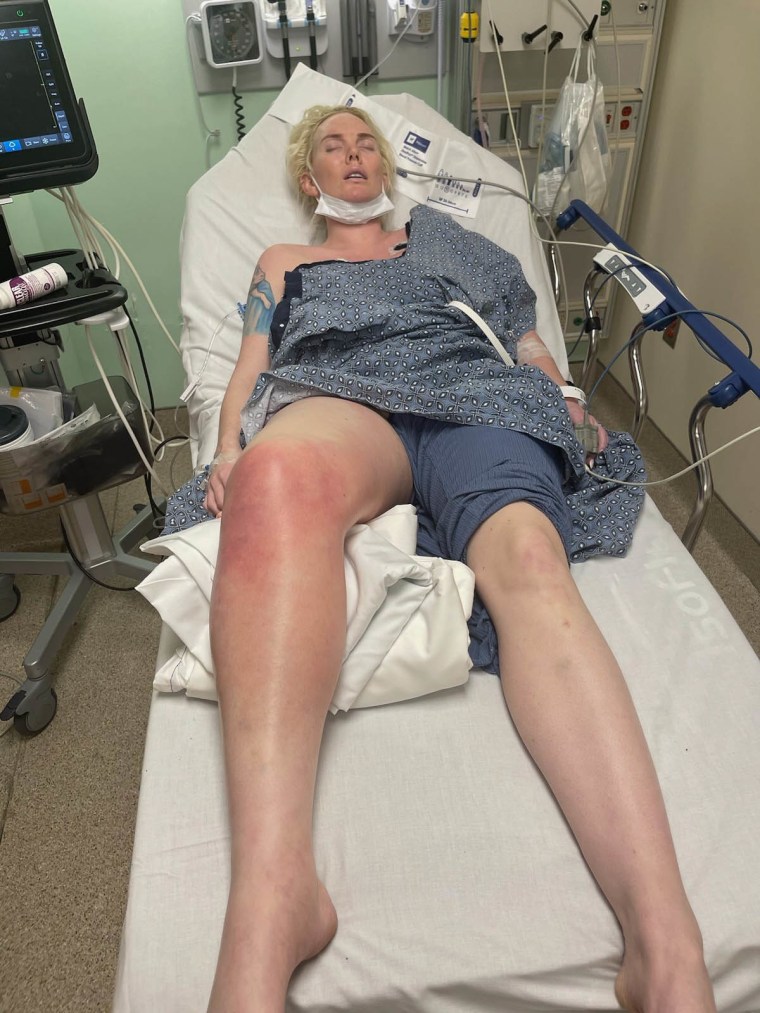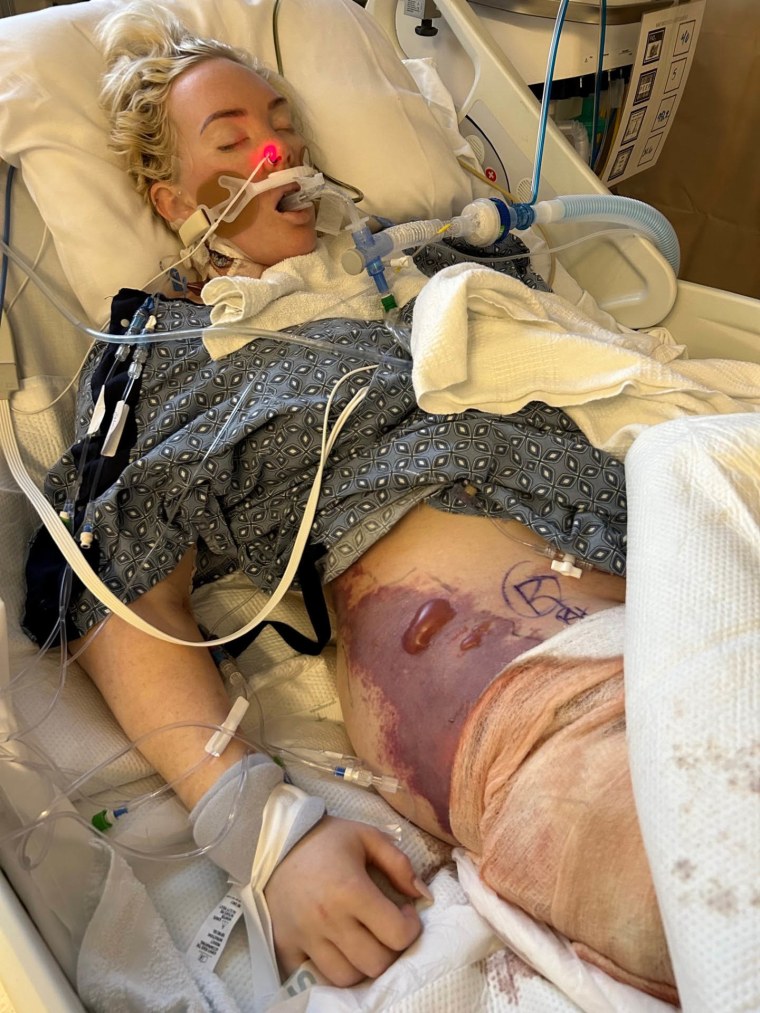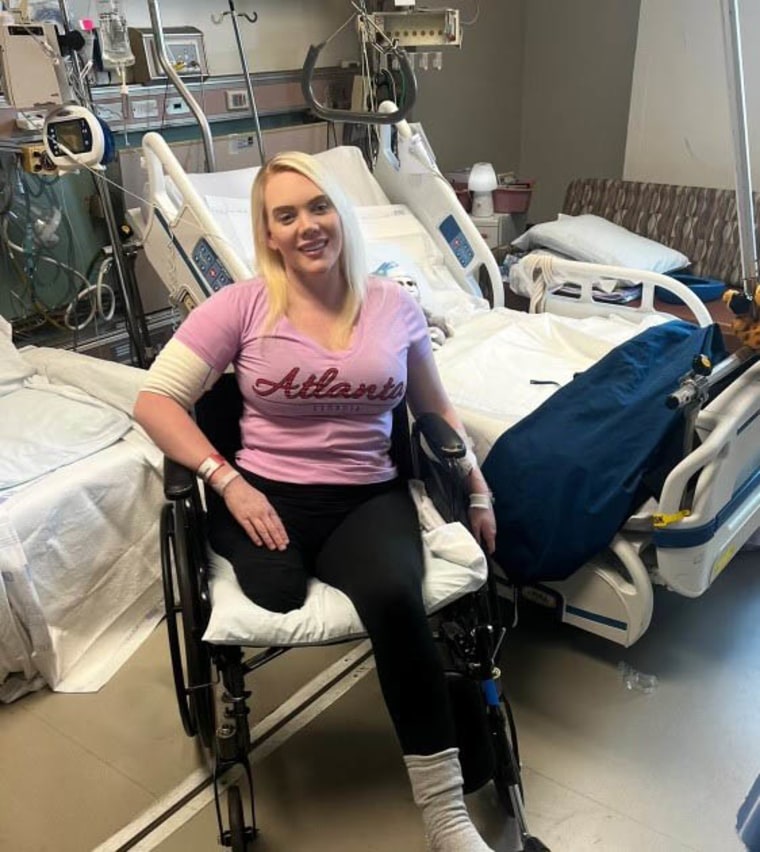#Woman, 33, Has Leg Amputated After Flesh-Eating Bacteria Infect Knee

Table of Contents
The flesh-eating infection that almost took Jennifer Barlow’s life — and ultimately her leg — started with vague symptoms that escalated quickly.
It was January 2023, and the U.S. Army veteran had just come back from a vacation in the Bahamas.
At 33, she was “healthy as an ox” and a regular gym-goer, she says.

But as she returned home to Atlanta, Barlow started feeling a little off, then very weak. After lying in bed for four days, she noticed her right knee started “ballooning up” and became red and hot to the touch.
“It was so swollen — it was at least three times the size of my left knee. It was really scary,” Barlow, who was a geospatial engineer in the U.S. Army, tells TODAY.com. “I was in excruciating pain.”

When she went to a local emergency room, doctors treated her knee as a sprain and sent her home with crutches and pain medicine, she says. But the knee kept getting bigger and looked “like a giant’s leg.” Then, she suddenly passed out.
When Barlow’s brother found her unconscious on the kitchen floor, she was taken to the Joseph Maxwell Cleland Atlanta VA Medical Center. That’s where doctors saved her life, she says.
‘Her life was in grave danger’
Tests showed Barlow had severe sepsis, says Dr. Jonathan Pollock, a surgeon who first saw her on Jan. 23.
“I was very concerned that she would not survive this,” Pollock tells TODAY.com. “It is fair to say that her life was in grave danger.”
Sepsis, the body’s extreme response to an infection, is a life-threatening medical emergency, the Centers for Disease Control and Prevention warns.
Barlow was in septic shock, the most severe complication of sepsis, and had kidney failure and signs of liver failure, says surgeon Dr. Tamra McKenzie-Johnson, who was also involved in her care. Barlow required a breathing machine and medication to maintain her blood pressure.
The veteran was diagnosed with necrotizing fasciitis, a rare infection with bacteria that can cause “flesh-eating disease,” the CDC notes. Even with treatment, up to 20% of patients die, according to the agency.
The infection gets deep under the skin to the lining of the muscle and moves along that surface very rapidly, destroying tissue, Pollock says.
Patients need “aggressive radical surgery” to remove as much of the dead flesh as possible, so doctors kept having to take out the soft tissue of Barlow’s thigh — the skin and the underlying tissue, he adds.

Barlow was in a medically induced coma for 10 days. When she woke up, she had already undergone 12 surgeries, she says.
“I was confused and scared,” she recalls. “I never in my life had heard of sepsis … and I had never heard of flesh-eating bacteria.”
What causes necrotizing fasciitis?
Barlow’s infection was caused by group A strep, a particularly virulent form of the bacteria that cause strep throat, Pollock says.
It’s the most common cause of necrotizing fasciitis, the CDC notes. Healthy people can get streptococcal necrotizing fasciitis, but it most commonly affects people who have a weakened immune system, it adds.
The bacteria can get into the body through a small cut in the skin, or they may already be present somewhere else in the body and get seated at the site of a small injury like a bruise, Pollock says.
Since she became ill just after returning from the Bahamas, Barlow suspects she may have been exposed to the bacteria in the warm water. But that’s associated with another type of bacteria — Vibrio vulnificus — which naturally live in certain coastal waters and can also lead to necrotizing fasciitis, according to the CDC.
Ultimately, doctors can’t say for sure where Barlow was exposed to the pathogen.
Once a person becomes infected, early diagnosis of necrotizing fasciitis is “notoriously difficult,” with one study showing it’s misdiagnosed 71% of the time, according to the Agency for Healthcare Research and Quality.
Meanwhile, sepsis is one of the top five misdiagnosed dangerous diseases in the U.S., a recent study found.
Seeking help for a prosthesis
After doctors got the infection under control with antibiotics, they tried to preserve as much of Barlow’s leg as possible, but they kept having to remove more dead tissue, McKenzie-Johnson says.
“We were all the way down to muscle on the thigh on her leg,” she recalls.
When the wound looked healthy and Barlow was stable after two weeks of care, she was transferred to Grady Memorial Hospital in Atlanta, which has experience in managing such extensive wounds, McKenzie-Johnson notes.
More surgeries followed — Barlow says she underwent almost 30 total — but the limb could not be saved. Almost her entire leg was amputated in March. Grady Memorial Hospital did not respond to a doctor interview request.

After months of hospitalizations, Barlow was finally able to come home at the end of May. She’s learning how to do day-to-day activities as an amputee, and is grateful for friends and neighbors for making her life as normal as possible.
Barlow is raising money for medical expenses on GoFundMe. She’s using a walker and a wheelchair to get around, so her focus now is to find a prosthesis that will fit her unique case.
The Atlanta VA says it will assist and cover her prosthetic needs, but Barlow also hopes she can meet with experts at the Walter Reed National Military Medical Center in Bethesda, Maryland.
“There are so many innovations and technology for prosthetics,” she says. “I’m extremely open to linking up with somebody who could help me.”
If you liked the article, do not forget to share it with your friends. Follow us on Google News too, click on the star and choose us from your favorites.
For forums sites go to Forum.BuradaBiliyorum.Com
If you want to read more News articles, you can visit our News category.




